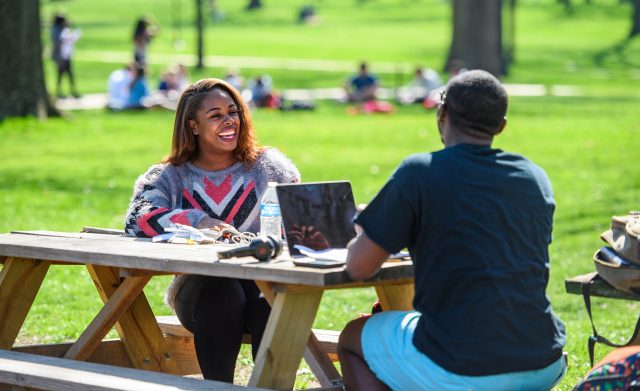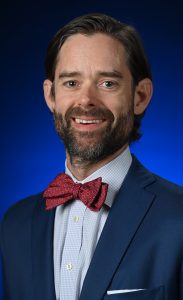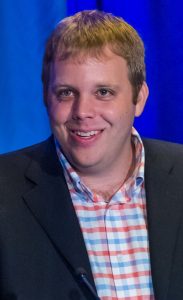
Graduate students in integrated marketing and communications are helping to design and market this year’s National Week of Conversation, partnering with the nonprofit Listen First Project. The week, set for April 17-23, will offer multiple opportunities to participate in digital discussions and events aimed at bridging the gap of toxic polarization in America. Photo by Robert Jordan/Ole Miss Digital Imaging Services
OXFORD, Miss. – Several University of Mississippi graduate students in integrated marketing communications are getting firsthand experience in the design and orchestration of the sixth annual National Week of Conversation, through partnering with Listen First Project, a 501(c)(3) nonprofit organization that aims to close the gap in a polarized American society through civic discussion.
Whether it’s uncomfortable conversations around the dinner table or vitriolic debates on the national stage, toxic polarization has climbed in recent years in the United States, according to data from the Pew Research Center.
The National Week of Conversation, April 17-23, will offer multiple opportunities to participate in digital discussions and events, including a screening of “The Abortion Talks” at 5 p.m. April 17 at the Jackson Avenue Center and a free, online public dialogue hosted by Essential Partners at 2:30 p.m. April 20.
Graduate students taking IMC 559: Advanced IMC Campaigns, taught by professor Graham Bodie, are creating the web design, marketing, video and overall structure for the week of events.
“I’m teaching them to build a plane while they fly it,” said Bodie, who has been working with Listen First Project since 2017. “This is what that looks like in real time. These are the ins and outs of collective collaborations.”
Beginning last fall, the 16 students met weekly with representatives of Listen First Project and affiliated nonprofits to talk about the divide in America and how the National Week of Conversation can begin to bring those groups together.
“What we know about change is it is not top-down,” Bodie said. “We are illustrating the power of local efforts to create a national change.”
The class has delved into collective impact – the utility of nonprofit groups bringing different skill sets to complex problems – and toxic polarization, said Kaylee Crafton, a second-year IMC graduate student from Kennett, Missouri, who is leading the team’s marketing efforts.
“Our nation feels very divided,” she said. “We’re seeing more of the strongest viewpoints on one side and the strongest viewpoints on the other.
“It’s creating this toxicity in the sense that we can’t even talk to each other, and we’re having these hateful, strong feelings against people we may not even know just because they associate with red or blue.”
Bridging, the term often used in Bodie’s discussion to indicate the connecting of disparate people groups, is not about changing viewpoints, Crafton said. It is about understanding one another.
Crafton said she believes the kind of bridging taught and encouraged during NWoC is an answer to the divide in America.
Throughout the class, nonprofit leaders talked about what the 2023 event should look like and how to best provide space for bridging to happen in real time.
“We wouldn’t be having this conversation if we didn’t think working together works,” said Pearce Godwin, CEO of Listen First Project. “This is our breakout year, and we have such an opportunity here.”
In early November, Godwin challenged the students to submit their “boldest and hairiest” ideas for the spring event during a meeting that also included representatives of more than a dozen affiliated nonprofit organizations to brainstorm ideas for 2023 NWoC events.
“This is why we have this team of graduate students – to bring those ideas to life,” Godwin said.

